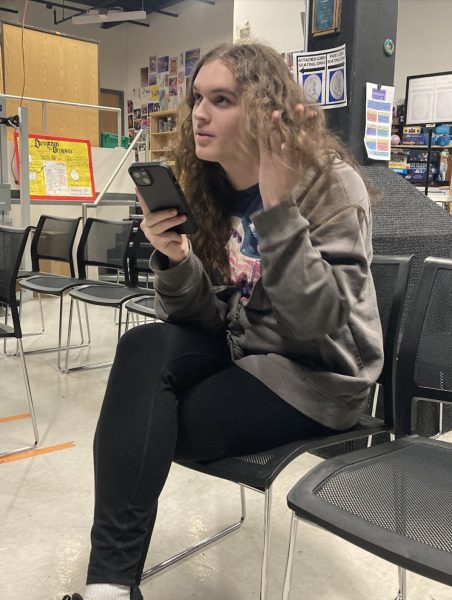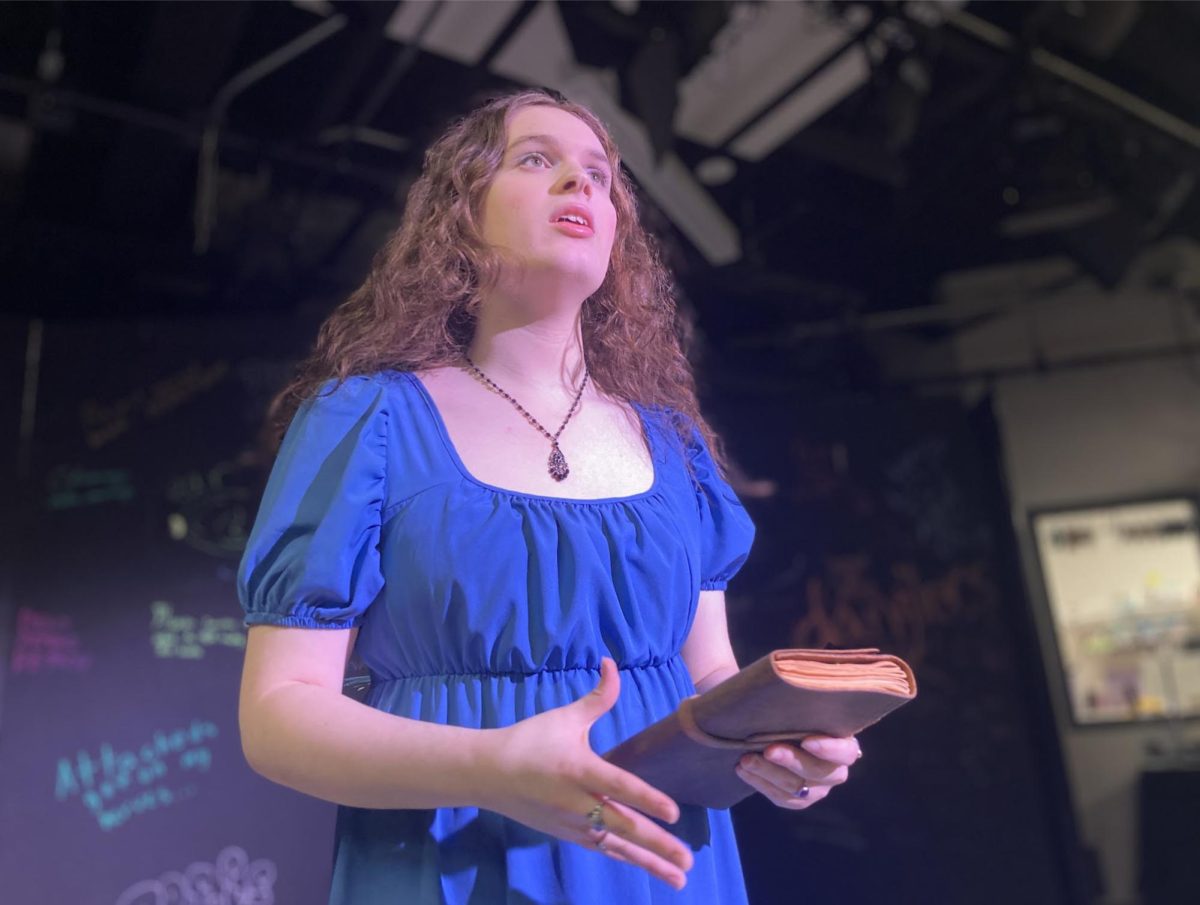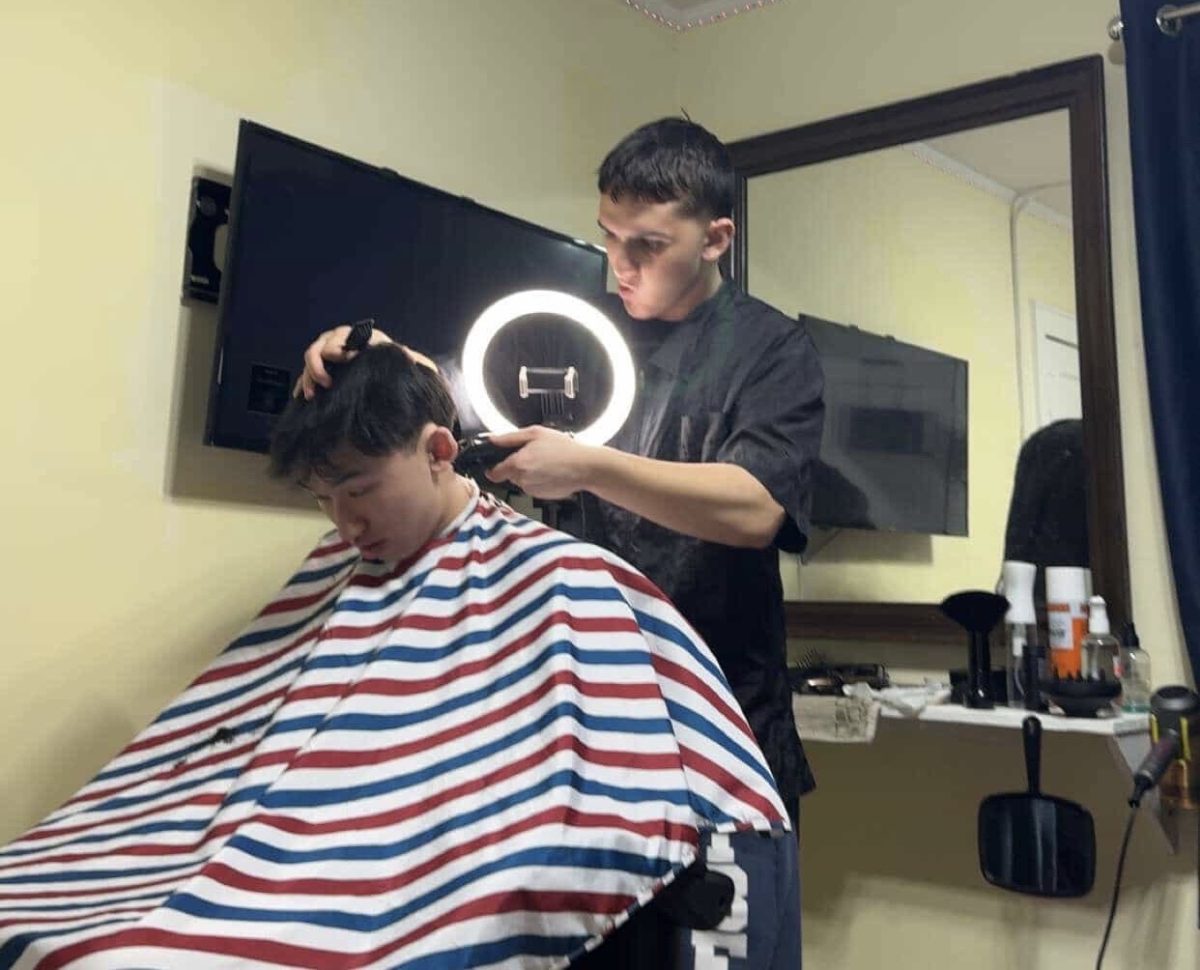The audience’s rapturous applause following the fire exit speech dissipates as the lights go down and a figure emerges onto the stage, shrouded in shadows. Those closest to the stage might catch the glint of their eye or notice the object they clutch to their chest. On cue, the stage doesn’t light up on a sunny day. Rather, the middle is illuminated with a soft violet that unveils the figure, swathing her vivid blue gown and pale skin with a ghastly glow. The light reveals her holding a worn leather-bound book, now held much more loosely. Her curly light-brown hair shifts as she, now the center of attention, approaches the audience.
“Connect. Connect. Connect the bonds that I once wrecked.”
Her captivating voice rings out, forcing the audience’s attention on her spectral visage, enveloped in ethereal light. Thus began the first act of the play Lobes, performed at the Great Neck Public Library, written and directed by Great Neck South High senior Beatrice “Bea” Pitt Stoller. Lobes was performed in the theater at Levels, a Great Neck Public Library cultural center. Levels offers weekly classes, art shows, recording facilities, and more, including theater productions. Lobes is about a girl named Bianca who is transported to an alternate universe where people’s societal roles and value are dependent on… their earlobe type, specifically, whether their lobe is attached or unattached to the side of their head.
Though the writing process started all the way back in late February of 2024, Pitt Stoller always knew “in the back of [her] head that Levels does original shows sometimes.” The revision process took place on and off for the next five months.
Pitt Stoller wrote the Lobes as “an answer to ‘But why X question about gender?’” For reference, the play contains discrimination of people based on their earlobes, a character who wears elf ears to prevent others from judging their lobe, and even a character who gets their earlobes cut to be unattached after the events of the play. Lobes serves as an allegory for gender theory, which is essentially about how gender is a social construct as opposed to a biological one. “The idea is: what if I made a new social construct?” said Pitt Stoller. “[And it isn’t] like people haven’t thought of inventing [new] social constructs as an example before, but I wanted to do earlobes because it’s funny and because I learned in biology class about different earlobes.”
Pitt Stoller first came into contact with Levels when she moved to Great Neck, and her dad, who had previously directed Levels productions in his youth, encouraged her to do the Levels theater program. Before writing Lobes, Pitt Stoller had written other one-acts, including Treasures of Cocytus, Bonus Cactus, and an “interactive” experience called National Pretzel Day. She had originally started playwriting for Levels since play festivals and student-directed productions were occasionally held there. “I had written some one acts before [writing Lobes],” she says, “and I really liked the experience.” While Pitt Stoller isn’t planning to direct a One-Act for Great Neck South, she does have an act centered around card tricks that she is considering for the next Coffee House. Pitt Stoller had known from the start that she wanted Lobes to be a play as “there’s nothing that works [better than] a play because [Lobes’] aim is to show how these characters interact in this world with the earlobes.”

Yet, writing plays comes with its own challenges. Specifically, Pitt Stoller found difficulties balancing her theater interests and life as a full-time student: “I will say, in the writing process, school is actually more annoying because I need my perfect, like, zen chamber to be able to write anything,” she says. Other obstacles Pitt Stoller found along the way included AP week, prior to which she had purposefully pushed herself to finish the first draft of Lobes so that she could fully focus on studying. However, after AP week, Pitt Stoller found it challenging to revise her first draft of Lobes: “After [AP] week, I took a two-week break, and then I was out of it, and I had to get back into [working on Lobes]. And it was hard.”
Despite being unable to get into her “zen chamber” mindset to write, Pitt Stoller continued steadily revising Lobes on and off over the next five months until early October. Pitt Stoller constantly kept consideration of both her cast and her own mental health in mind throughout the writing and rehearsals of Lobes, not wanting to force a single step in the process. “If I can’t make it to rehearsal, I don’t make it to rehearsal,” she says, recounting an instance where she was feeling unwell in school after recovering from an illness and decided to rest and recover instead of forcing herself through rehearsal.
To those who want to write a play, whether it be an allegory for an ongoing social issue, a reimagining of historical figures, or anything else, Pitt Stoller advises to keep writing. Do not stop thinking or rewriting; just keep writing until you have everything down on a sheet of paper or a digital document, and save all the thinking for the revision step. “I originally had one Google Doc titled ‘Earlobe Racism’ where I wrote down a couple of ideas for [Lobes] and very vague thought structure, and I think that helped me because I got to think about it,” she says, “A lot of the brainstorming I did, just like, what I could in the shower or like during gym class.” Pitt Stoller also believes that school, while an annoying interruption, can be a somewhat positive factor in the writing process since it forces you to take a break. “School kind of forces you to take time away sometimes, which isn’t great. But it could also give you new ideas. Just like giving you time to think,” she says.






